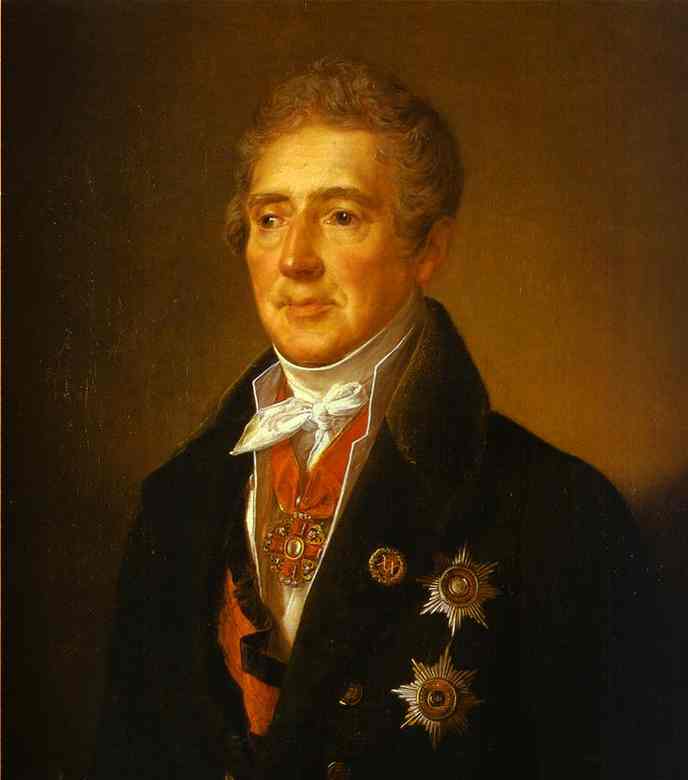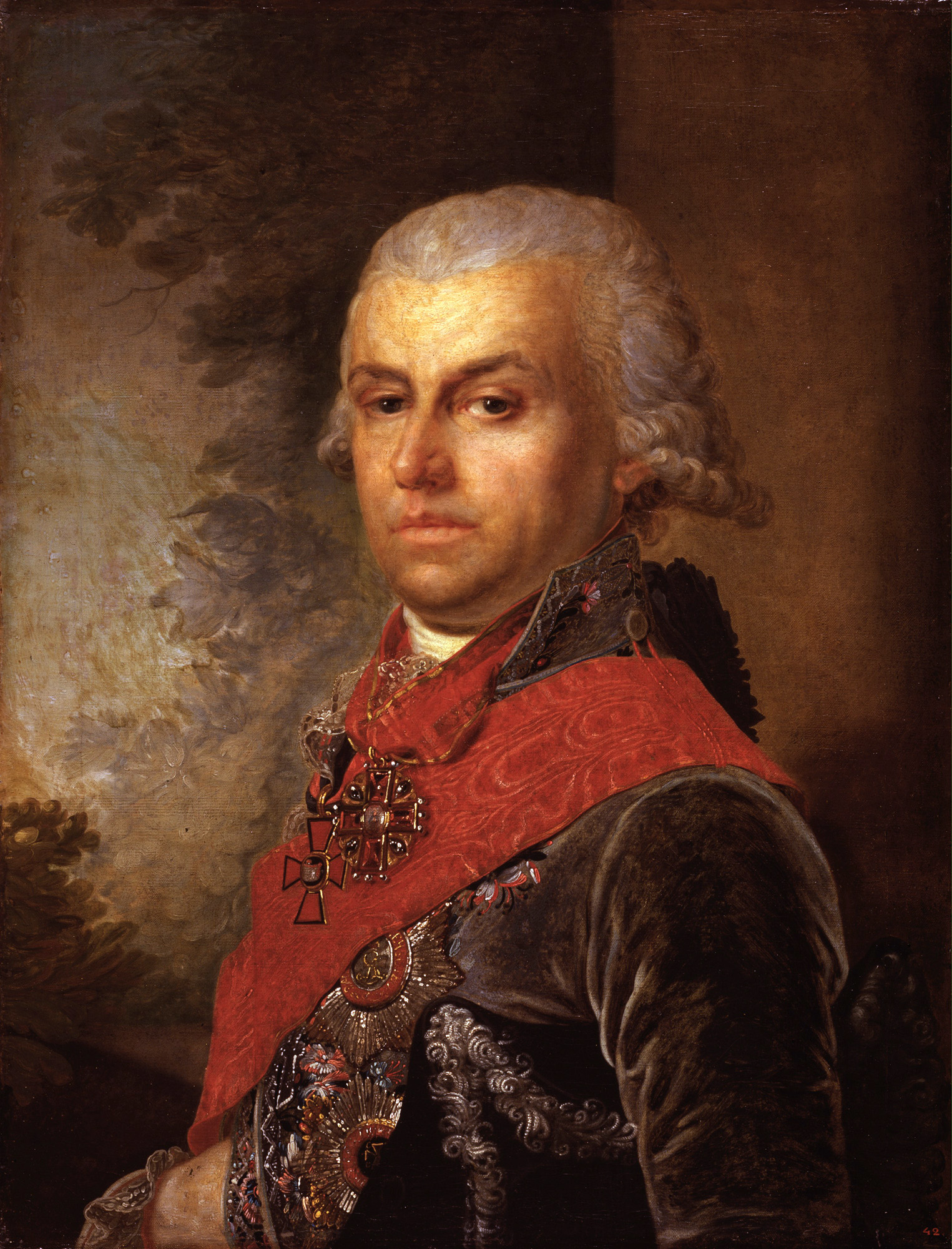|
Ivan Dmitriev
Ivan Ivanovich Dmitriev ( rus, Ива́н Ива́нович Дми́триев, p=ɪˈvan ɨˈvanəvʲɪdʑ ˈdmʲitrʲɪjɪf, a=Ivan Ivanovich Dmitriyev.ru.vorb.oga; – ) was a Russian statesman. He was also a poet associated with the sentimentalist movement in Russian literature. Dmitriev was born at his father's estate in the government of Simbirsk. In consequence of the revolt of Yemelyan Pugachev, the family had to flee to Saint Petersburg, and there Ivan was entered at the school of the Semenov Guards, and afterwards obtained a post in the military service. On the accession of Paul I to the imperial throne, he quit the army with the rank of colonel; and his appointment as procurator for the senate was soon after renounced for the position of privy councillor. During the four years from 1810 to 1814 he served as minister of justice under the Emperor Alexander I; but at the close of this period he retired into private life, and though he lived more than twenty y ... [...More Info...] [...Related Items...] OR: [Wikipedia] [Google] [Baidu] |
Tropinin Dmitriev 1835
Vasily Andreevich Tropinin (; – ) was a Russian Romanticism, Romantic painter. Much of his life was spent as a serf, not attaining freedom until he was more than forty years old. Three of his more important works are a portrait of Alexander Pushkin and paintings called '':Image:Tropinin lacemaker.jpg, The Lace Maker'' and '':Image:Tropinin ZolotoshveykaGTG.jpg, The Gold-Embroideress''. Biography Vasily was born as a serf of Count Munnich in the village Chudovsky District, Korpovo of Velikiy Novgorod, Novgorod guberniya. He was transferred to Count Morkov as part of the dowry of Munnich's daughter. Soon he was sent to Saint Petersburg to study the trade of a confectioner. Instead of learning his trade Tropinin secretly attended free drawing lessons in the Imperial Academy of Arts. In 1799, his owner allowed Tropinin to study at the Academy as a non-degree student (''Postoronny uchenik''). He took lessons from S. S. Schukin and was supported by the President of the Academy ... [...More Info...] [...Related Items...] OR: [Wikipedia] [Google] [Baidu] |
Yermak Timofeyevich
Yermak Timofeyevich (, ; 1532 (supposedly) – August 5 or 6, 1585) was a Cossack ataman who started the Russian conquest of Siberia during the reign of the Russian tsar Ivan the Terrible. He is today a hero in Russian folklore and myths. Russian interests in the fur trade fueled their desire to expand east into Siberia. The Tatar Khanate of Kazan established by Ulugh Muhammad was the best entryway into Siberia. In 1552, Ivan the Terrible's modernized army toppled the khanate.Lincoln, p. 30 After the takeover of Kazan, the tsar looked to the powerful and affluent Stroganov merchant family to spearhead the eastward expansion. In the late 1570s, the Stroganovs recruited Cossack fighters to invade Asia on behalf of the tsar.Lincoln, p. 40 These Cossacks elected Yermak as the leader of their armed forces, and in 1582 Yermak set out with an army of 840 to attack the Khanate of Sibir.Lincoln, p. 41 On October 26, 1582, Yermak and his soldiers overthrew Kuchum Khan's Tatar empir ... [...More Info...] [...Related Items...] OR: [Wikipedia] [Google] [Baidu] |
1760 Births
Events January–March * January 9 – Battle of Barari Ghat: Afghan forces defeat the Marathas. * January 22 – Seven Years' War – Battle of Wandiwash, India: British general Sir Eyre Coote is victorious over the French under the Marquis de Bussy-Castelnau. * January 28 – Benning Wentworth creates the New Hampshire Grant of Pownal, Vermont. * February 15 – The British Royal Navy ship HMS ''Royal Katherine'' runs aground off Bolt Head in England, with the loss of 699 lives. * February 21– 26 – Seven Years' War: Battle of Carrickfergus in the north of Ireland – A force of French troops, under the command of privateer François Thurot, captures and holds the town and castle of Carrickfergus before retiring; the force is defeated (and Thurot killed) in a naval action in the Irish Sea, on February 28. * February 27 – Seven Years' War: French and Indian War & Anglo-Cherokee War – Cherokee natives attack a ... [...More Info...] [...Related Items...] OR: [Wikipedia] [Google] [Baidu] |
Members Of The State Council (Russian Empire)
Member may refer to: * Military jury, referred to as "Members" in military jargon * Element (mathematics), an object that belongs to a mathematical set * In object-oriented programming, a member of a class ** Field (computer science), entries in a database ** Member variable, a variable that is associated with a specific object * Limb (anatomy), an appendage of the human or animal body ** Euphemism for penis * Structural component of a truss, connected by nodes * User (computing), a person making use of a computing service, especially on the Internet * Member (geology), a component of a geological formation * Member of parliament * The Members, a British punk rock band * Meronymy, a semantic relationship in linguistics * Church membership, belonging to a local Christian congregation, a Christian denomination and the universal Church * Member, a participant in a club or learned society A learned society ( ; also scholarly, intellectual, or academic society) is an organizatio ... [...More Info...] [...Related Items...] OR: [Wikipedia] [Google] [Baidu] |
Justice Ministers Of The Russian Empire
In its broadest sense, justice is the idea that individuals should be treated fairly. According to the ''Stanford Encyclopedia of Philosophy'', the most plausible candidate for a core definition comes from the ''Institutes'' of Justinian, a 6th-century codification of Roman law, where justice is defined as "the constant and perpetual will to render to each his due". A society where justice has been achieved would be one in which individuals receive what they "deserve". The interpretation of what "deserve" means draws on a variety of fields and philosophical branches including ethics, rationality, law, religion, and fairness. The state may pursue justice by operating courts and enforcing their rulings. History Early Western theories of justice were developed in part by Ancient Greek philosophers such as Plato in his work '' The Republic'', and Aristotle, in his ''Nicomachean Ethics'' and ''Politics''. Modern-day Western notions of justice also have their roots in Christian t ... [...More Info...] [...Related Items...] OR: [Wikipedia] [Google] [Baidu] |
Poets From The Russian Empire
A poet is a person who studies and creates poetry. Poets may describe themselves as such or be described as such by others. A poet may simply be the creator ( thinker, songwriter, writer, or author) who creates (composes) poems (oral or written), or they may also perform their art to an audience. The work of a poet is essentially one of communication, expressing ideas either in a literal sense (such as communicating about a specific event or place) or metaphorically. Poets have existed since prehistory, in nearly all languages, and have produced works that vary greatly in different cultures and periods. Throughout each civilization and language, poets have used various styles that have changed over time, resulting in countless poets as diverse as the literature that (since the advent of writing systems) they have produced. History Ancient poets The civilization of Sumer figures prominently in the history of early poetry, and The Epic of Gilgamesh, a widely read epic poe ... [...More Info...] [...Related Items...] OR: [Wikipedia] [Google] [Baidu] |
Dmitry Troschchinsky
Dmitry (); Church Slavic form: Dimitry or Dimitri (); ancient Russian forms: D'mitriy or Dmitr ( or ) is a male given name common in Orthodox Christian culture, the Russian version of Demetrios (, ). The meaning of the name is "devoted to, dedicated to, or follower of Demeter" (Δημήτηρ, ''Dēmētēr''), "mother-earth", the Greek goddess of agriculture. Short forms of the name from the 13th–14th centuries are Mit, Mitya, Mityay, Mit'ka or Miten'ka (, or ); from the 20th century (originated from the Church Slavic form) are Dima, Dimka, Dimochka, Dimulya, Dimusha, Dimon etc. (, etc.) St. Dimitri's Day The feast of the martyr Saint Demetrius of Thessalonica is celebrated on Saturday before November 8 Old Style and New Style dates">Old Style: October 26]. The name day (именины): October 26 (November 8 on the Julian Calendar) See also: Eastern Orthodox liturgical calendar. The Saturday before this is called Demetrius Saturday and commemorates the Orthodox soldiers ... [...More Info...] [...Related Items...] OR: [Wikipedia] [Google] [Baidu] |
List Of Justice Ministers Of Imperial Russia ...
This is a list of ministers of justice of Russia. Russian Empire Provisional Government/Russian Republic Russian SFSR Russian Federation Timeline See also * Justice Minister * Russian Council of Ministers * Prosecutor General of Russia External links *List of Imperial Russian Ministers (1802-1917)* {{in lang, ru}Official site of the Public Prosecutor Justice Justice In its broadest sense, justice is the idea that individuals should be treated fairly. According to the ''Stanford Encyclopedia of Philosophy'', the most plausible candidate for a core definition comes from the ''Institutes (Justinian), Inst ... [...More Info...] [...Related Items...] OR: [Wikipedia] [Google] [Baidu] |
Pavel Lopukhin
Pavel ( Bulgarian, Russian, Serbian: Павел; Czech, Slovene, and (although Romanian also uses Paul); ; ; ) is a male given name. It is a Slavic cognate of the name Paul (derived from the Greek Pavlos). Pavel may refer to: People Given name *Pavel I of Russia (1754–1801), Emperor of Russia *Paweł Adamowicz (1965–2019), Polish politician * Paweł Brożek (born 1983), Polish footballer *Paweł Cibicki (born 1994), Swedish footballer * Paweł Deląg (born 1970), Polish actor *Pavel Durov (born 1984), Telegram founder *Paweł Fajdek (born 1989), Polish hammer thrower *Pavel Haas (1899-1944), Czech composer who was murdered during the Holocaust *Paweł Jasienica (1909–1970), Polish historian, journalist, essayist and soldier *Paweł Kisielow (born 1945), Polish immunologist *Pavel Kuzmich (born 1988), Russian luger *Paweł Łukaszewski (born 1968), Polish composer *Paweł Mąciwoda (born 1967), Polish bassist for the German rock band Scorpions *Paweł Mykietyn (born ... [...More Info...] [...Related Items...] OR: [Wikipedia] [Google] [Baidu] |
Moscow
Moscow is the Capital city, capital and List of cities and towns in Russia by population, largest city of Russia, standing on the Moskva (river), Moskva River in Central Russia. It has a population estimated at over 13 million residents within the city limits, over 19.1 million residents in the urban area, and over 21.5 million residents in Moscow metropolitan area, its metropolitan area. The city covers an area of , while the urban area covers , and the metropolitan area covers over . Moscow is among the world's List of largest cities, largest cities, being the List of European cities by population within city limits, most populous city entirely in Europe, the largest List of urban areas in Europe, urban and List of metropolitan areas in Europe, metropolitan area in Europe, and the largest city by land area on the European continent. First documented in 1147, Moscow became the capital of the Grand Principality of Moscow, which led the unification of the Russian lan ... [...More Info...] [...Related Items...] OR: [Wikipedia] [Google] [Baidu] |
Siberia
Siberia ( ; , ) is an extensive geographical region comprising all of North Asia, from the Ural Mountains in the west to the Pacific Ocean in the east. It has formed a part of the sovereign territory of Russia and its predecessor states since the lengthy conquest of Siberia, which began with the fall of the Khanate of Sibir in 1582 and concluded with the annexation of Chukotka in 1778. Siberia is vast and sparsely populated, covering an area of over , but home to roughly a quarter of Russia's population. Novosibirsk, Krasnoyarsk, and Omsk are the largest cities in the area. Because Siberia is a geographic and historic concept and not a political entity, there is no single precise definition of its territorial borders. Traditionally, Siberia spans the entire expanse of land from the Ural Mountains to the Pacific Ocean, with the Ural River usually forming the southernmost portion of its western boundary, and includes most of the drainage basin of the Arctic Ocean. I ... [...More Info...] [...Related Items...] OR: [Wikipedia] [Google] [Baidu] |





